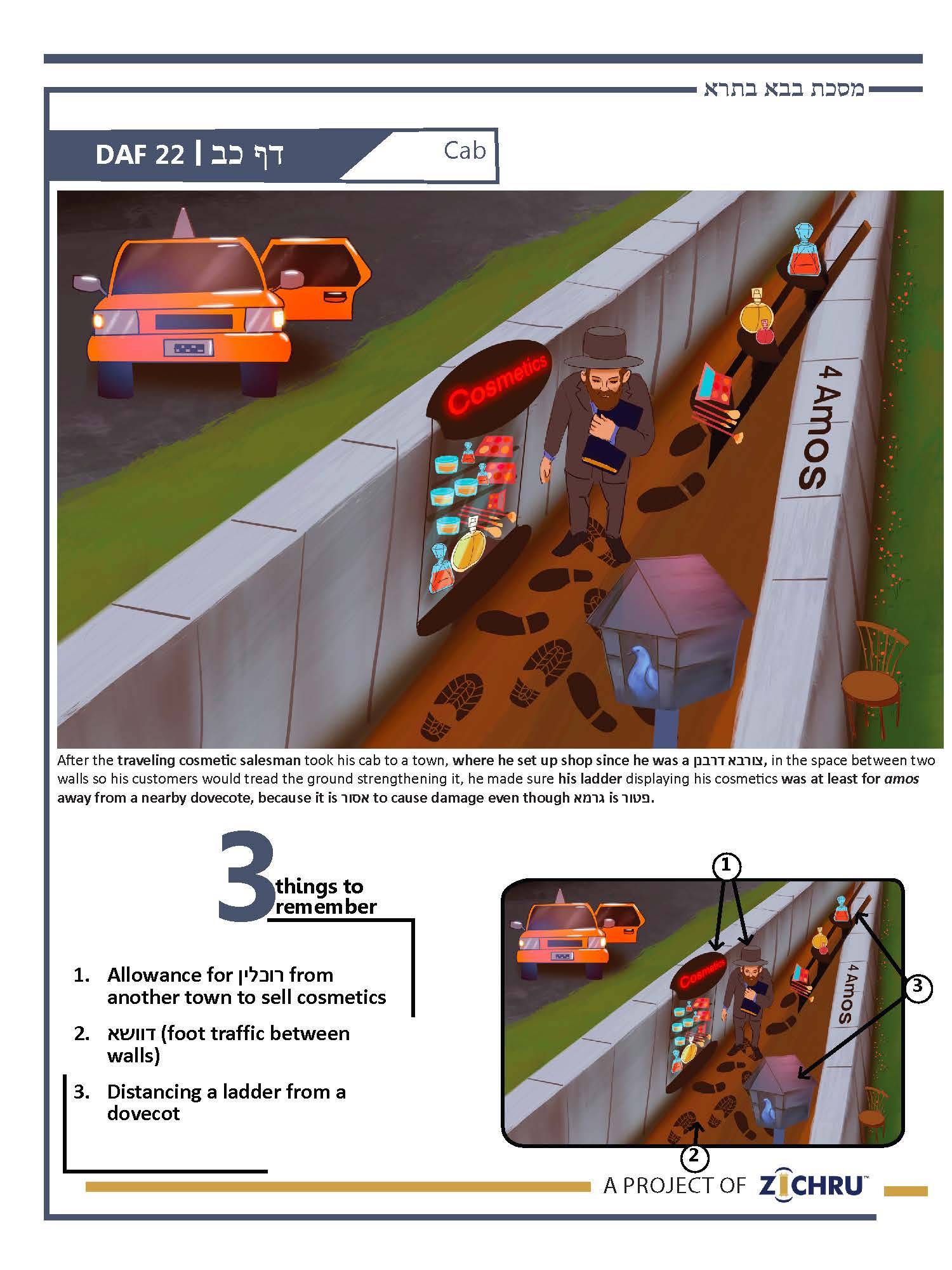Bava Basra - Daf 22
- Audio Timestamps
0:00 - The 3 Sugyos
2:58 - Review of 3 Sugyos
5:49- Siman
8:26 - 4 Blatt Back Chazarah
15:29 - Pop Quiz (Last 7 blatt)
For access to all Zichru resources including PDFs, and illustrations CLICK HERE
- Allowance for רוכלין from another town to sell cosmetics
On the previous Daf, Rav Huna brei d’Rav Yehoshua said that tradesmen of a town can prevent tradesmen from elsewhere from offering services in their town. Rav Nachman bar Yitzchak says that he agrees regarding רוכלין המחזירין בעיירות – peddlers who go from town to town selling cosmetics, דלא מצי מעכב – that the[merchant] of that town cannot stop them, because Ezra decreed that peddlers should go from town to town to sell cosmetics, כדי שיהו תכשיטין מצויין לבנות ישראל – so that cosmetics would be available to the daughters of Yisroel. However, this dispensation was only לאהדורי – to go around selling his wares and then leave, אבל לאקבועי לא – but not to permanently set up [shop]. Still, if the peddler is a צורבא מרבנן – Rabbinical student, he is even allowed to permanently set up shop, as we find that Rava made such allowances, דלא כהילכתא – not like the ordinary law. Since they are Rabbinical students, אתו לטרדו מגירסייהו – they may be distracted from their learning if they would have to go around to sell cosmetics.
- דוושא (foot traffic between walls)
The next Mishnah states: מי שהיה כותלו סמוך לכותל חבירו – One whose wall was near his neighbor’s wall לא יסמוך לו כותל אחר – may not place another wall near [the neighbor’s wall], אא"כ הרחיק ממנו ארבע אמות – unless he distances it four amos from [the neighbor’s wall]. The Mishnah implies that there was previously a wall near his neighbor’s wall, which later fell, and he is rebuilding. The Gemara wonders: וקמא היכי סמיך – But how did he put the first [wall] nearby, and only must distance the second wall? After rejecting the first answer, Rava says the Mishnah’s case is where the first wall was originally סמוך לכותל חבירו ברחוק ארבע אמות – “near” his neighbor’s wall, at a distance of four amos, and after it fell, he cannot build a second wall closer than those four amos. The reason is: דדוושא דהכא מעלי להתם – the treading (i.e., people walking) here (between the walls) is beneficial there (to the ground under his wall), by strengthening the ground underneath. The Gemara adds that this does not apply to the wall of a chatzeir in an old city, where the ground has already been hardened from people walking over the years.
- Distancing a ladder from a dovecote
The next Mishnah states: מרחיקין את הסולם מן השובך ארבע אמות – One must distance a ladder four amos from a neighbor’s dovecote, כדי שלא תקפוץ הנמייה – so that a marten should not jump from the ladder into the dovecote. The Gemara asks if the Mishnah disagrees with Rebbe Yose, who said (regarding planting a tree near a neighbor’s pit): זה חופר בתוך שלו וזה נוטע בתוך שלו – this one can dig in his property, and that one can plant a tree in his property and is not required to prevent his roots from damaging the neighbor’s pit. Similarly, Rebbe Yose would presumably allow leaving a ladder near his neighbor's dovecote. The Gemara responds that Rebbe Yose may agree here, because Rav Ashi said: מודי רבי יוסי בגירי דידיה – Rebbe Yose agrees regarding “his arrows” (i.e., direct damage), and here, too, it is possible that a marten will jump onto the ladder as he is placing it. However, the Gemara protests that it is still only גרמא – causative damage (i.e., indirect), for which one is not liable!? Rav Tuvia bar Masna said: זאת אומרת גרמא בניזקין אסור – this [Mishnah] teaches that causative damage is forbidden, although exempt from paying.
Siman – Cab
After the travelling cosmetic salesman took a cab to a town, where he set up a shop since he was a צורבא מרבנן, in the space between two walls so his customers would tread the ground strengthening it, he made sure his ladder displaying his cosmetics was at least four amos away from a nearby dovecote, because גרמא בניזקין אסור although he is patur from paying.


